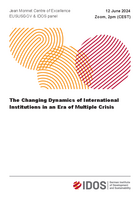The Changing Dynamics of International Institutions in an Era of Multiple Crisis
Event Type
Panel Discussion
Location / Date
Online, 12.06.2024
Emel Parlar Dal (Project Director, Marmara University) and Stephan Klingebiel (Head of Programme, IDOS)
In an era marked by unprecedented global challenges, the dynamics of international institutions are undergoing profound transformation. From climate emergencies to pandemics, economic instabilities to geopolitical tensions, the landscape of crises is multifaceted and ever-evolving. The role and efficacy of international institutions—once hailed as bastions of collective action and global governance—are facing increasing scrutiny and adaptation. Geopolitical shifts, economic pressures, and the strategic interests of member states play a crucial role in the decision-making processes of IO expansion. For instance, the desire to enhance regional stability and security may incentivize international organizations to accept new members. Additionally, the expansion of trade networks and market integration necessitates the inclusion of new countries to promote economic growth and cooperation. (Gray et al., 2016).
On the other hand, the unexpected global and regional crisis like the 2008 financial crisis, the Syrian civil war, the pandemic, Russian Invasion of Ukraine and very recently Gaza war seem to have forced the international institutions, formal and informal, to respond to the crises and new geopolitical threats within the international system. As a result, we are witnessing a period where the structure and processes of international platforms are adapting to respond to the challenges posed by this new multi-crisis environment. As a new development, the EU has accelerated its Western Balkans enlargement process. On the other hand, the OECD, which started its enlargement policy in 2007, reinvigorated it in 2022 and 2024 and began accession negotiations with seven countries including Argentina, Brazil, Bulgaria, Croatia, Peru, Indonesia, and Romania.
The enlargement trend can also be closely observed in the realm of informal international institutions, as evidenced by two subsequent enlargement cases of two informal governmental organizations: the G20 and BRICS.
In September 2023, the African Union became a permanent member of the G20, while Egypt, Ethiopia, Iran, Saudi Arabia, and the United Arab Emirates joined the BRICS alliance in January 2024. This was only the second round of BRICS’ expansion after South Africa in 2010. Similar to that of the EU, other regional organizations like Shanghai Cooperation Organisation (SCO) took the decision for enlargement with offering full membership status to new states. In 2017, India and Pakistan became full members of the Shanghai Cooperation Organization and in 2023 Iran has gained full membership status in SCO and Saudi Arabia has agreed to join the as a “dialogue partner”.
In a similar vein, another regional organization, NATO has also expanded in 2024 with the integration of two new members to the Alliance, Finland and Sweden. Externally, NATO’s enlargement has been influenced by a variety of geopolitical factors. The Alliance’s growth often occurs in response to the security needs of European countries seeking membership as a means to safeguard their sovereignty and territorial integrity.
Given this background, our panel will tend to respond the following questions: How do international institutions navigate the complexities of our contemporary world and seek to address the pressing issues of our time? Under which conditions and with which driving factors does the expansion of international institutions, -formal and informal-, occur? What may be the positive and negative outcomes of the current enlargement trend of international institutions? Will the enlargement of international institutions in response to the challenges posed by multiple internal and external crises contribute to the strengthening of multilateralism? In what ways does the expansion of Western international institutions differ from that of non-Western institutions in the Global South? Are these enlargements driven by similar motives and systemic and regional factors? What are the potentials for mixed alliances or institutions such as G20? How do countries manage their engagements in international institutions?
Speakers
- Dr. Melis Baydağ, Ruhr University Bochum & German Institute of Development and Sustainability (IDOS)
- Professor Sachin Chaturvedi, Research and Information System for Developing Countries (RIS)
- Dr. Niels Keijzer, German Institute of Development and Sustainability (IDOS)
- Dr. Philani Mthembu, Institute for Global Dialogue
- Assoc. Professor Jeffrey Robertson, Yonsei University
- Dr. Laura Trajber Waisbich, University of Oxford
- Dr. Huanyu Zhao, University of Ghent
Hinweis
Während unserer Veranstaltungen werden z.T. Foto- und/oder Filmaufnahmen gemacht, die für Zwecke der Veranstaltungsberichterstattung und allgemeinen Öffentlichkeitsarbeit in verschiedenen Medien veröffentlicht werden. Sie haben jederzeit das Recht, die Foto- oder Videograf*innen darauf hinzuweisen, dass Sie nicht aufgenommen werden möchten. / During our events photos and/or videos may be taken which may be published in various media for the purposes of documentation and PR activities. You have the right at any time to point out to the photographer or videographer that you do not want to be photographed or filmed.
Event information
Date / Time12.06.2024 / 14:00
LocationOnline
Contact / Registration

Prof. Dr. Stephan Klingebiel
Head of Research Programme “Inter- and Transnational Cooperation”

